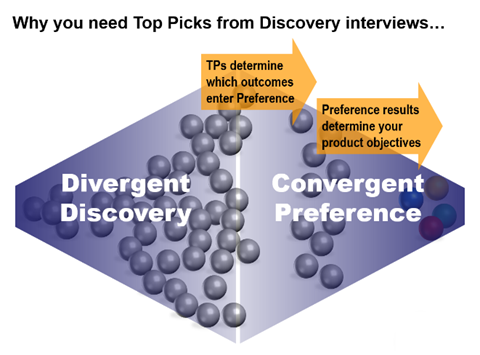1. Purpose of Top Picks
Be sure to gather 5-to-10 of the customer's TPs at the end of your Discovery interview.
For the most part, Discovery interviews use divergent customer thinking, to uncover as many outcomes as possible. This helps you avoid errors of omission… failing to uncover an unarticulated need. Next, Preference interviews use convergent thinking to narrow the focus to just those outcomes that are both important and currently unsatisfied. This lets you avoid errors of commission… choosing the wrong needs to pursue.
But even though Top Picks occur in divergent Discovery interviews, they mark the beginning of convergent thinking. Here you ask customers to select their favorite ideas—those they are most eager to see improved. They may have generated 20 or 30 outcomes (one per sticky note), and you’ll ask them to narrow this to 5-to-10 Top Picks at the end of the interview.
Why do this? After you’ve finished all your Discovery interviews, you’ll need to reduce the dozens of outcomes you’ve heard to just 10… which you’ll ask about in Preference interviews. Since your project is typically market-focused—designed to satisfy several customers, not one—you won’t have the luxury of customers helping you narrow the list to 10. Your team will need to do this internally.

To make sure customer voices are not lost in the internal process, you’ll only consider customers’ Top Picks. Put another way, the outcomes rated in Preference interviews will be drawn only from the market’s Top Picks. And the more often an outcome was cited as a Top Pick, the more likely your team will be to include it in Preference interviews.
In the next two BlueHelp articles, you'll see two different ways to gather customers' Top Picks, Informal Top Pick selection, and Voting method for Top Pick selection. For more on Discovery interviews, see e-Learning Module 15: Discovery Interviews at www.blueprintingcenter.com > e-Learning.
Keywords: Top Picks, TP, TPs, TP selection, choosing Top Picks, Discovery interview, outcomes, divergent, convergent